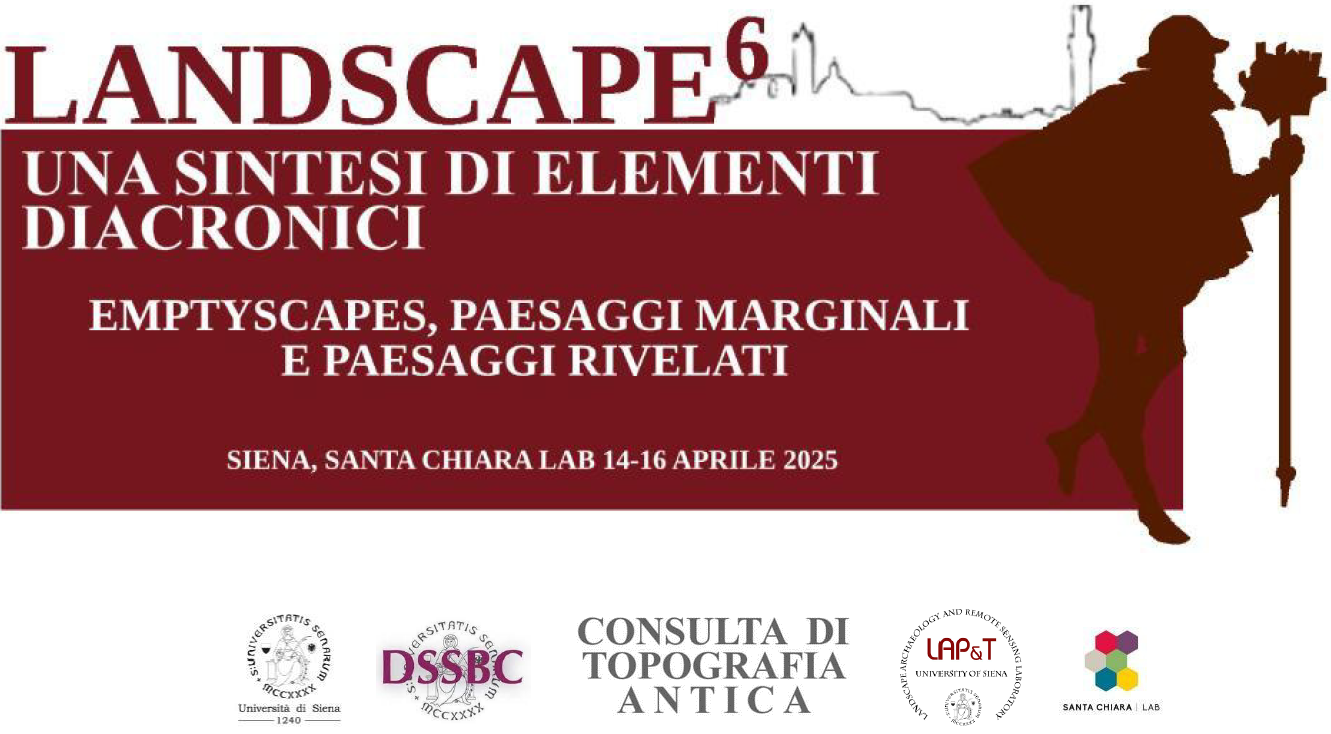
The call for papers for the sixth edition of Landscape is now closed and the final programme will be published soon. Follow our social media to make sure you don't miss the next updates.
KEYNOTE SPEAKER: Prof. ROBERT WITCHER (Durham University), Prof. HECTOR A. ORENGO (ICREA, Catalan Institute of Classical Archaeology).
SCIENTIFIC COMMITTEE: Giuseppe Ceraudo, Stefano Campana, Beatrice Fochetti, Davide Gangale Risoleo, Enrico Giorgi, Stephen Kay, Paolo Liverani, Maria Luisa Marchi, Giovanna Pizziolo, Stefania Quilici Gigli, Marcello Spanu, Jacopo Turchetto.
ORGANISING COMMITTEE: Benedetta Baleani (La Sapienza University of Rome), Giuseppe Prospero Cirigliano (IMT Lucca), Alessia Mandorlo (University of Salento), Elena Pomar (The British School at Rome/University of Pisa), Federico Ugolini (University of Siena).
SESSIONS
1. FROM CITY TO TERRITORY: ANALYSIS, EXPLOITATION, AND MANAGEMENT
The first session focuses on the complex relationships between cities and suburban landscapes by seeking to identify the systems of reciprocal influence, interconnection, and interaction between them. The session includes those themes related to the understanding of various categories of territories, the analysis of territorial social and political aspects, and the exploitation and management of natural resources and economic systems, by prioritising research on those landscapes that fit within the definition of ‘marginal’. In this regard, mountains and forests, as well as lagoons and coastal areas, may have had different physiognomies and meanings than those we apply today. This raises questions on how to examine and interpret the complex relationships between cities and suburban landscapes by exploring dynamics of interaction and mutual influence.
2. COMMUNICATION ROUTES: SECONDARY ROADS, MINOR SETTLEMENTS, AND MARGINAL LANDSCAPES
The second session explores the relationship between secondary roads and ‘marginal’ landscapes. Key attention will be paid to ‘minor’ thoroughfares owing to their important role in connecting territories and creating links between settlements and peripheral landscapes. In this session, the role of transhumance routes, short- and medium-distance trade, and maritime and lagoon routes will be explored by highlighting how these communication networks influenced the physiognomy and development of ‘marginal’ landscapes. Analysing the landscape in these terms fosters the creation of a more articulated and structured picture of the vital role of secondary communication routes.
3. UNVEILING THE INVISIBLE: APPROACHES AND METHODS FOR THE STUDY OF COMPLEX LANDSCAPES
The third session focuses on the identification and application of new approaches, methods, and instruments, including those borrowed from other disciplines, which are suitable for the analysis of highly-complex landscapes. New tools, including A.I. and remote sensing, assume great importance in the study of ancient landscape contexts, both terrestrial, and underwater. For instance, geophysical prospection represents an increasingly widespread tool in archaeological investigations. Such is the increasing popularity of these techniques that they are no longer considered auxiliary or secondary in archaeological research but rather have become essential for the identification and understanding of challenging landscapes.
4. WHEN HUMAN ACTIONS MAKE A TERRITORY INACCESSIBLE: FROM DATA COLLECTION TO CULTURAL DIPLOMACY IN WAR ZONES
The fourth session explores how archaeological heritage faces significant threats from armed conflict and terrorism, leading to the destruction and looting of important cultural sites (Palmyra and Aleppo) which span various historical periods (from the Prehistoric, Byzantine, Roman, to the Islamic periods). The violence within these conflicts is not, of course, limited to the destruction of heritage sites, but also to looting and the increasing illicit trafficking of antiquities. With traditional protections failing, documentation and public engagement have become vital for preserving knowledge of these sites. This session will focus on global strategies for documenting and monitoring archaeological objects and landscapes in conflict zones, including management and reconstruction methods. Additionally, it will explore the role of archaeology in international relations and the concept of cultural diplomacy to promote joint efforts in heritage preservation.
5. EMPTYSCAPES, MARGINAL LANDSCAPES, AND REVEALED LANDSCAPES
The fifth session investigates the transformations of landscapes in marginal contexts in order to compare these dynamics with those related to other types of territories. The session focuses on theoretical and methodological aspects by referring to the interpretation of spatial distributions and to various meanings applied to settlement hierarchies and infrastructural patterns. The discussion deepens in previous studies and understands the highly significant impact of supposed gaps by bringing out the difference in content between ‘empty scapes’ and ‘revealed landscapes’.
KEYNOTE SPEAKER: Prof. ROBERT WITCHER (Durham University), Prof. HECTOR A. ORENGO (ICREA, Catalan Institute of Classical Archaeology).
COMITATO SCIENTIFICO: Giuseppe Ceraudo, Stefano Campana, Beatrice Fochetti, Davide Gangale Risoleo, Enrico Giorgi, Stephen Kay, Paolo Liverani, Maria Luisa Marchi, Giovanna Pizziolo, Stefania Quilici Gigli, Marcello Spanu, Jacopo Turchetto.
COMITATO ORGANIZZATORE: Benedetta Baleani (La Sapienza University of Rome), Giuseppe Prospero Cirigliano (IMT Lucca), Alessia Mandorlo (University of Salento), Elena Pomar (The British School at Rome/University of Pisa), Federico Ugolini (University of Siena).

